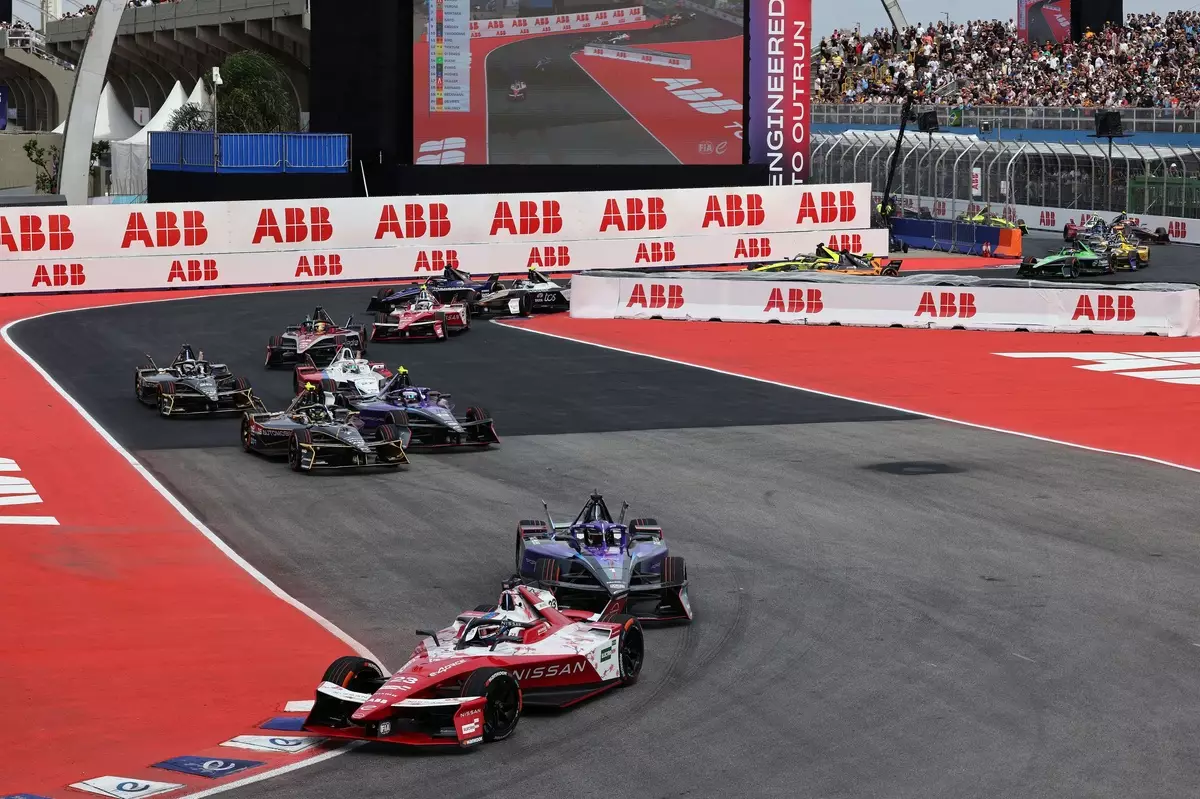The 2024-2025 Formula E season began with considerable anticipation, especially for Nissan Formula E driver Oliver Rowland. Starting from the second position in the Sao Paulo E-Prix, Rowland was drawn into a captivating battle, not only for supremacy on the city street circuit but also for potential redemption after the previous season’s misfortunes. Securing a spot alongside reigning champion Pascal Wehrlein, who narrowly claimed pole position by a mere 0.099 seconds, set the stage for an electrifying race. As the lights went out, fans and teams alike were hopeful for a thrilling contest that would only bolster the sport’s standing in the electric racing community.
However, the highs of racing are often intertwined with the lows of missed opportunities, and for Rowland, this race would be a bitter reminder. He took an early lead away from Wehrlein, showcasing not just speed but also the efficacy of his Nissan vehicle. Rowland’s early dominance on the circuit would soon be overshadowed by errors that would cost him dearly, culminating in a disappointing 14th-place finish despite leading 17 out of 35 laps.
In his post-race reflections, Rowland expressed frustration, indicating that multiple mistakes played a role in sabotaging his race strategy and potential victory. He commented, “It’s hard to accept sometimes,” highlighting the emotional weight that comes with being so close to success yet falling short. The undercurrent of disappointment was palpable as he articulated that there were “more than one f**k up” that influenced the outcome of his day.
One significant miscalculation occurred during the first stages of the race when Rowland briefly lost the lead to Nick Cassidy, who effectively utilized the all-wheel-drive Attack Mode. Yet, it was later tactics that would prove even more detrimental. After two activations of the Attack Mode and a red flag caused by an accident involving Jake Dennis, Rowland was poised for a commanding lead. Unfortunately, a drive-through penalty would dash his hopes shortly thereafter, marking a critical juncture in the race where potential victory turned into mere survival.
Rowland hinted that the confusion surrounding the displayed number of laps contributed to his mismanagement of energy, a grave error he had experienced in a previous race in Misano. “Not the same, but similar,” Rowland noted, revealing that the miscommunication regarding laps left him ill-prepared and fuel depleted as he finally cleared his penalty. As he dropped to eighth position after the penalty, the capsizing effect on energy management had significant repercussions for his race strategy.
The penalties incurred, which Rowland termed as stemming from “overpower,” not only afflicted him but also affected teammates and competitors alike, primarily Norman Nato and customer entries from McLaren. The irony The stark contrast lay in how these penalties were handled. While others such as Taylor Barnard and Sam Bird managed to navigate through the penalties early in the race, allowing them a strategic advantage to reclaim positions later on, Rowland found himself in a precarious situation—one where energy conservation would play a crucial role.
Rowland expressed confusion post-race regarding the implications of the initial starts. He attributed his own penalty to a lack of awareness about the performance issues that his competitors were facing. “It comes from the start,” he explained, emphasizing how the dynamics of the first few moments on the track set the tone for the remainder of the race. In an ever-competitive environment like Formula E, every misstep is magnified, and Rowland’s experience illuminated the fine line between success and failure.
The pressing question now is how Rowland will respond to this setback. Racing thrives on resilience, and the lessons learned from Sao Paulo must transform into a blueprint for future races. Adapting quickly to the intricacies of race strategies, pit management, and energy conservation will be paramount for Rowland as the season unfolds.
The Sao Paulo E-Prix served not just as a season opener but as a crucible for growth and knowledge. Rowland’s story is a reminder of the unpredictability of motorsport, where preparation meets a relentless pursuit of excellence. For both Rowland and the Nissan team, the opportunity to learn from these early challenges cannot be overstated. The essence of racing lies in its ability to teach amidst trials, and with the right focus, the lessons learned can fuel greater successes in the future races ahead.

